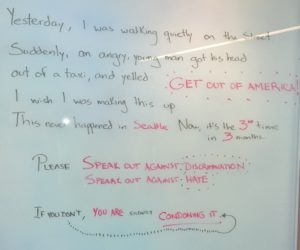Empathy. Intention. Action.
I read this article today. It’s about one black woman’s experience at school and work. I don’t have the same experiences as her – it’s not my story. I don’t know exactly how she feels. I can try to empathize, though, and think about my intentions and actions.
When the author describes teachers and colleagues making racial insults, I don’t know exactly what she thought and felt in those moments. I imagine she was angry and frustrated because those are the feelings that I had when reading about it. It brought to mind what it felt like when I’ve attempted to stand up for myself to people who had authority over me.
It doesn’t take much effort to try to empathize with someone who is hurt.
Taking action is harder than empathy because there’s risk.
At the end of the article, the author refers to an incident at a Seattle Starbucks that is described on KUOW’s site as A man shouts racial slurs in a Seattle Starbucks. The silence is deafening. In a crowded coffee shop, only one bystander offered support when two people were verbally attacked and spit on.
Maybe the other customers were afraid they would say or do the wrong thing, so they did nothing. Or they didn’t want to draw attention to themselves. Or they worried if they offered to help, they would be asked to provide assistance that they didn’t want to give.
There’s risk involved.
A couple of years ago I spent some time in an office building. One day I noticed writing on a whiteboard in a hallway. It said “Yesterday, I was walking quietly on the street. Suddenly, an angry young man got his head out of a taxi, and yelled, “Get out of America!” This never happened in Seattle. Now it’s the 3rd time in 3 months…Please speak out against discrimination. Speak out against hate. If you don’t, you are silently condoning it.”
Maybe the person wrote it hoping that people who haven’t experienced this kind of harassment will become more aware of it, have empathy for it, and offer support when they witness it.

The writing on the whiteboard was untouched for three days. Then a new message was added that said something like “I’m sorry this happened. I will speak up if I see it.” A couple other notes were added. The next day the whiteboard was blank again.
It wasn’t hard to empathize with the person who was yelled at from a taxi and asked us not to be silent bystanders.
It was hard, however, for that person’s coworkers to react – even through a few anonymous words on a white board.
It’s even harder to offer support to a stranger who’s been called racial slurs in a coffee shop.
These aren’t my experiences of hate speech. They aren’t my stories and it isn’t my place to end with a big statement about combating discrimination. But I can empathize. I can think about my intentions and actions. And maybe I can be brave enough to risk saying or doing something, even if it isn’t perfect.

Recent Comments